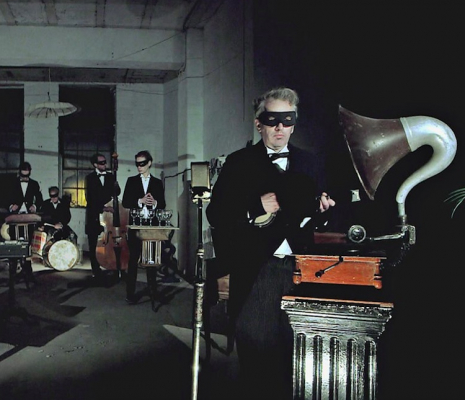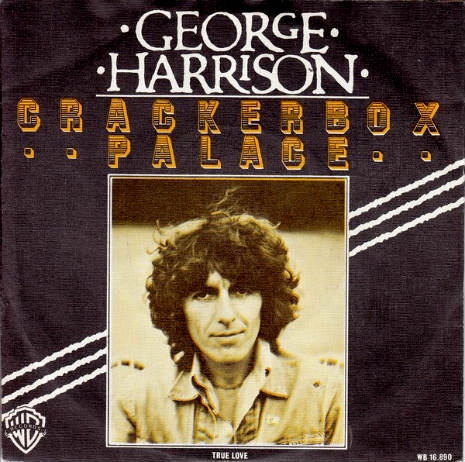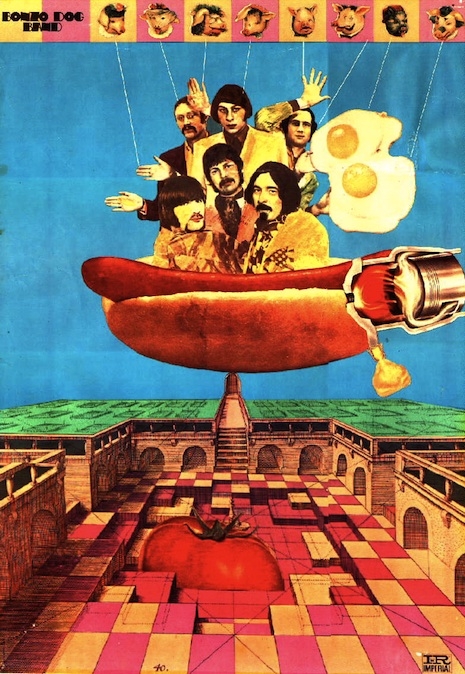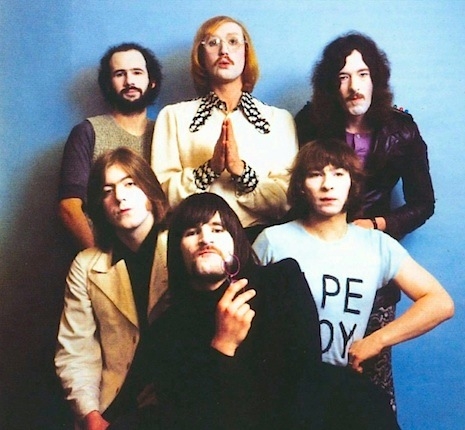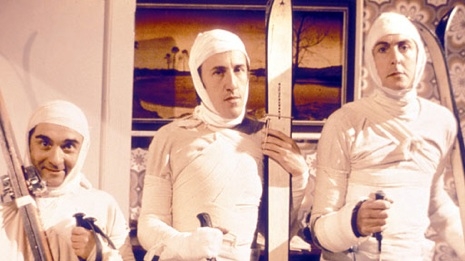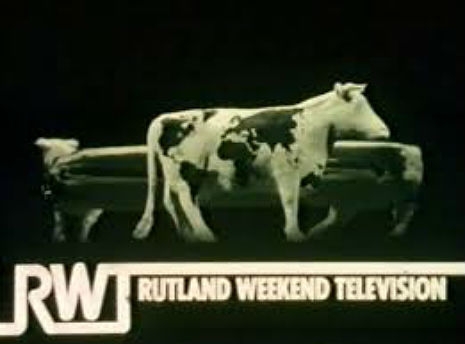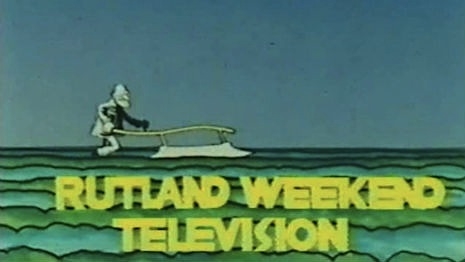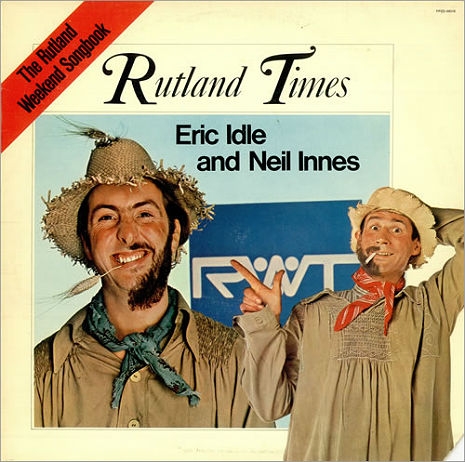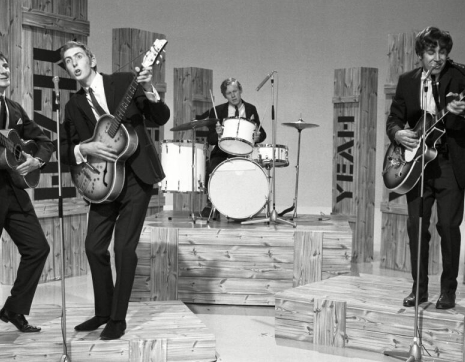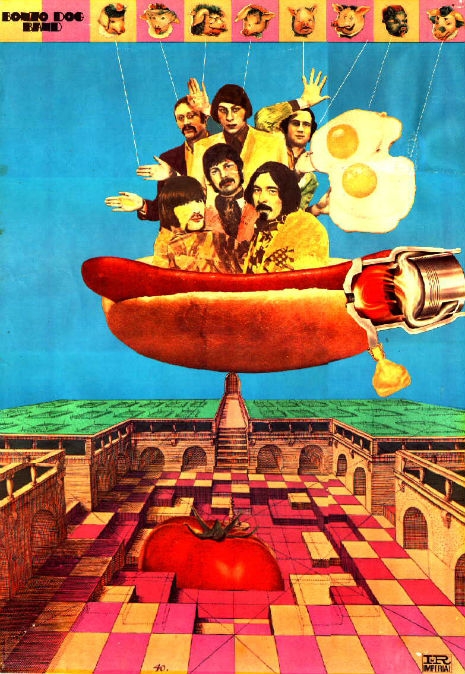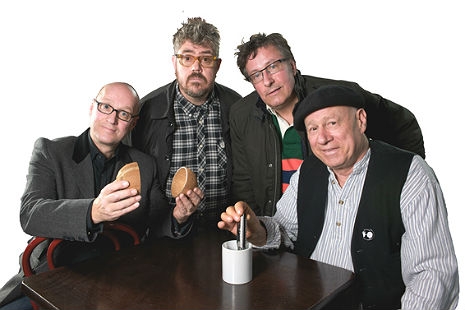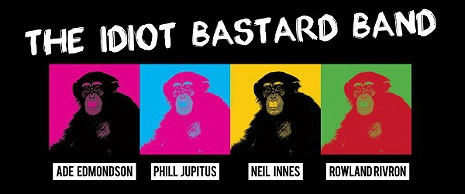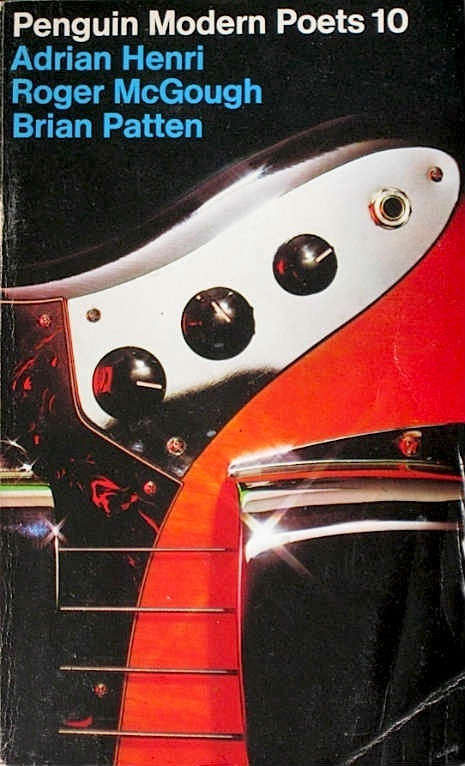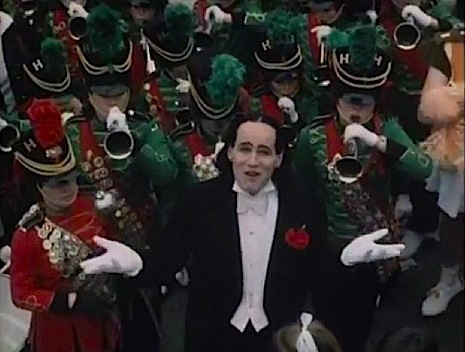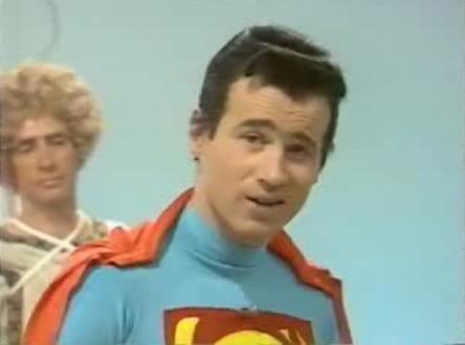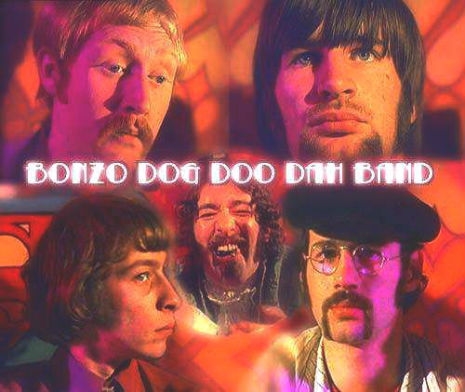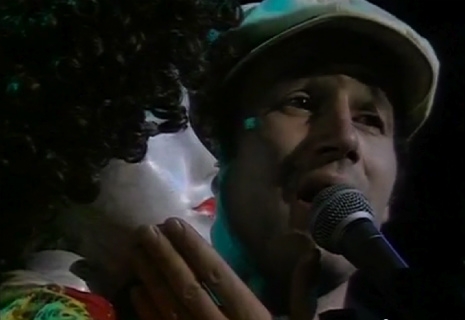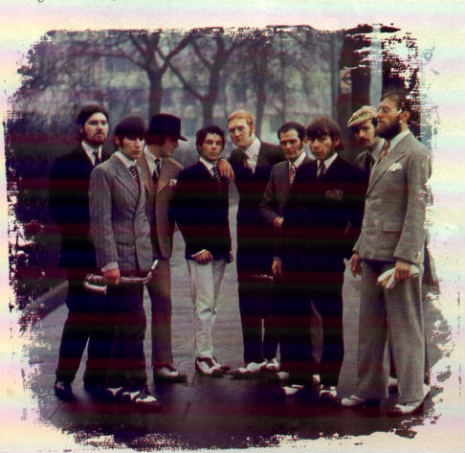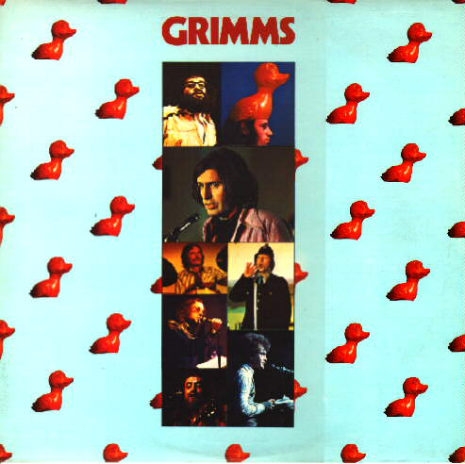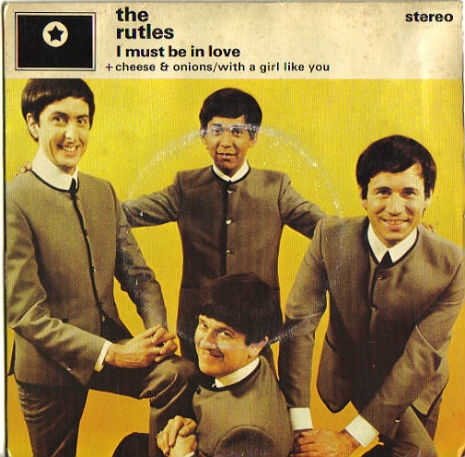
Neil Innes as “Ron Nasty,” right. There will be a partial Rutles reunion later this month in the UK.
Because this interview already runs quite long, I don’t want to burden the text with much of a preamble. I think my feelings about the music of the great Neil Innes are pretty clear from the opening question (and if you want to know how I really feel...), but if they aren’t I’ll point you in the direction of an earlier Dangerous Minds post that I wrote about him that has lots of video clips.
The following, wide-ranging interview was conducted via email back and forth primarily while Neil and his wife Yvonne were visiting some of her relatives in Norway. As anyone who has gotten an email from me since 2009 knows, I have a quote from an Innes-penned Bonzo Dog Band song as my sigfile [“There are no coincidences, but sometimes the pattern is more obvious.”] so we used the secret word “Groucho” in the subject line so a search through my Gmail didn’t bring up 60,000 results.
As there is a newly released “Le Duck’s Box Set” of Neil’s three CD Recollections anthology, which includes a bonus DVD of sixteen videos from his Innes Book of Records TV series of the late 1970s and early 80s, that’s more or less where we started:
Richard Metzger: As a big fan of your music since I was very young, I will unashamedly state that I think you’re one of the greatest songwriters that Britain has ever produced. As a fan, I also find it frustrating that your work doesn’t really get the attention it deserves, but it must come down to the fact that you’ve effortlessly mastered so many musical genres that you just can’t be pigeonholed. “Le Duck’s Box,” the new retrospective of your Collections collections available from your website roams all over the place stylistically—an Elton John pastiche, country and western, dub reggae, punk, “New Wave,” Eurovision cliches, Stevie Wonder—and it’s absolutely pitch perfect every time. You’re not a parodist like Weird Al, but neither are you a “wry” songwriter in the mold of Ray Davies, either—compare your idea of “Shangri la” to his—or Loudon Wainwright III.
Your music is as beautiful as it is funny, but it’s an art form that stands apart. Where do you see yourself fitting in or are you perhaps more properly viewed as a genre consisting only of yourself—as many, myself included, would argue?
Neil Innes: Wow! What a question! Is there a short answer? No.
Yes I am different. I don’t try to “fit in.” The Music Business is well known for it’s systematic cultivation and exploitation of sentimentality for financial gain. We all know that. I am an observer. I am more like a painter than a songwriter, more of an artist than a salesman. I am an idiot.
My work gets all the attention it needs. Those who come across it seem to understand it – and even enjoy it – it is successful in its own small, one to one way. True - it is not easy to “pigeonhole” or describe - but I like that.
Why? Because I believe History has proved that Naming and Measuring does not necessarily mean understanding. Aristotle wrote 3 books on Physics – then a 4th - all about what could NOT be named and measured. He called it “Metaphysics.” I’ll settle for being “a far cry from anything you can put your finger on.”
It’s the same with “genres.” Whether it’s a likeness or a shared feeling, Art can only parody Nature because Parody is the nature of Art. Art is a make-believe game that runs through the centuries, from cavemen to CEOs. Never quite the real thing or the whole story because the whole story is forever beyond human experience.
We are once upon a time things. As sociable creatures we strongly feel the need to follow rules of conformity and the desire to accumulate wealth and be admired by others would appear to be top of the list. But I would argue that we all too easily forget that each one of us consists of as many cells as there are stars in the Milky Way. And that’s just one galaxy. Hollywood? Fame? Don’t make me laugh! Oh all right – go on then… once upon a time there were two Irishmen – now look how many there are! Thank you Abbott and Costello… wait a moment - there IS a short answer - “Absolutely!”
Richard Metzger: Maybe you’re the last vaudevillian?
Neil Innes: Maybe I am. Glad I wasn’t the first Vaudevillian - it must have been terrifying!
Richard Metzger: The box set is from the era of your Innes Book of Records TV series and there’s a DVD of several clips from that. Until YouTube and bit torrenting came around, that material went largely unseen for decades, even by your biggest fans. I feel like IBOR is really your magnum opus—you’re carrying the whole thing creatively, musically and you’re in practically every shot as a performer— in a sense, IBOR is kind of like your take on Vaudeville, isn’t it?
Neil Innes: Well, if by Vaudeville you mean “Variety” – then yes – I’m guilty as charged. When Ian Keill, (the producer of Rutland Weekend Television), expressed a desire to make a kind of Rutland Weekend Songbook, we naturally followed in the best BBC tradition and had lunch.
Over soup we heartily agreed that putting pictures to music is a lot of fun, allowing, even demanding, a more abstract approach to entertainment than mainstream television. Over Mains, with a good wine, we discussed how Television has always sadly lacked the basic confidence that viewers are indeed sentient individuals with some kind of emotional equilibrium and that this is why it is constantly “in your face.” Dessert brought the euphoria of a title: “The Innes Book of Records.”
And so it was decided. We would make “Songs and Pictures about People and Things.” But we also agreed that if anyone began to wonder what on earth it was all about – then we would have failed. I suppose there is a lot of “me” on screen but the truth is we didn’t have that big a budget. Michael Palin was a guest and only got the minimum Actors Union rate! IBOR depended on variety, surprise and the unexpected. It was a little “in your face” – but in a laid back way. It was only television after all…
Richard Metzger: I noticed that you’ve got a petition to get the BBC to rerun IBOR on your website. They should! I’ve only seen it myself in recent years and it’s still totally fresh. Surprisingly so—a parody of punk rock from 1979 effortlessly achieves greater authenticity in 2013! (Lucky for you, the same can be said of virtually every genre that you’ve dabbled in.) IBOR would go over great with a generation raised on things like The Mighty Boosh.
Neil Innes: I suppose we were blazing a trail back then – the Music Business was just about to discover “videos” – but I have always loved all kinds of music. As a child I used to conduct the radio with a ruler – and a bare bottom - just before my bedtime diaper. And as “Bonzos,” we reveled in every kind of music. “Pop” music is totally about all kinds of music – much of it very silly! You can’t let all that silliness go prancing by without a little hoot or a catcall!
Yes – I’ve put up a petition – because people are forever asking me if the BBC is going to show it all again – or put it out on DVD. But the number of signees is not all that encouraging, considering we had a peak of 7.5 million viewers in the second series. By the third series, the BBC did me the honour of treating me like Monty Python – changing broadcast times and even cancelling because of snooker. Maybe THEY don’t like it – too weird? It could be that the petition is in the wrong place – my IBOR website is the poor cousin to neilinnes.org – 15 years old this month! Thank you Bonnie Rose and Laurie Stevens! Anyway, what will be will be – there’s an idea for a song – I’m with Duke Ellington when he said: “There are two kinds of music – good and bad.”
“How Sweet to Be an Idiot” Sound like something else you’ve heard before, perhaps?
Richard Metzger: That makes for a very easy segue to the next question: “So what was it like to collaborate with Oasis?” I found it delightfully ironic that the world’s most flagrant Beatles… well, wannabes, got sued for ripping off the world’s finest forger of Lennon and McCartney!
Neil Innes: Ah! First of all let me say that Oasis were perfect gentlemen and no one actually got sued! Yes, they had to part with money but that was all sorted out by EMI Music Publishers Ltd. “Their people” were hung out of the window by “my people.” I got “whatever” scraps they threw me! (Ha!)
It was the same with The Rutles. The Music Business is like a school where Big Boys come and take your candy away. No other business in the world gets away with Stealing like the Music Business – apart from Banking.
Yes – on second thoughts – Banking AND the Music Business are the only enterprises in the World that are actually based on Stealing. There ought to be a law against taking stuff that does not belong to you. It should be written in stone.
What gets me is the Denial! Did you know there are 14 songs hidden away in the vaults of International Copyright that are credited to “Innes, Lennon and McCartney”? It’s all there – in black and white! However - under no circumstances am I to be credited for writing any “part” of these compositions. What’s more, I am forbidden to tell anyone this! Yes! It’s all there – in the so-called Settlement Agreement. So – if anyone wants to cover one of the first Rutle songs – like Galaxy 500 did with “Cheese and Onions” – remember - it has to be just “Lennon/McCartney” on the cover or the label.
Now, working with THOSE guys was a blast! I’ll never forget it…
Richard Metzger: Whoa, wait a minute, back up, there… What exactly happened?
Neil Innes: You mean with Lennon and McCartney? Nothing happened! That’s my point. But according to the legal eagles of the music industry I must have collaborated with them in order to write those first 14 Rutle songs. That’s the real irony – people have been copying the Beatles ever since they became the most acclaimed haircuts in the world. No other beat group has influenced popular music more than the Fab Four.
They were famous for being “inventive” – playing with all kinds of genres – and “experimental” - keeping their “creativity” alive and fresh by openly celebrating a vast variety of musical influences. You could argue that not one Beatles song is like another – certainly not in the later years.
But when you imitate them deliberately – whether for comic effect or to simply demonstrate how much you admire their craftsmanship – the music industry throws the book at you. Yet I had no “Criminal Intent” – I should have been allowed to walk free – just like those Banking Fraudsters of 2008. Bradley Manning’s Defense Team take note! “NO CRIMINAL INTENT”!
What actually happened was, when ATV Music [then owners of Northern Songs] threatened my publishers with legal action, my “people” were advised that they would certainly win but it was unlikely they would be awarded “Costs.” ATV Music had a “slush fund” of a million dollars to file lawsuits against Beatles copyright “infringements.” It’s always about the money. I really wanted it to go to court - so my publishers opted for a “Settlement Agreement.”
Two years later, after my deal with them was over, my publishers demanded an extra album from me because they claimed I had delivered an album of non-original material! The nerve! I told them to “fuck off”… and they did.
Richard Metzger: That’s astonishing. What a shitty act of corporate intimidation. I presume this means a Rutles musical on Broadway would be unlikely? I’ve read that Paul McCartney was “chilly” to All You Need Is Cash at the time. I wonder if he gets the joke by now?
Neil Innes: I don’t think Paul has any issues with me, or Ricky or John. We pretty much just did the music. I think a bit of teasing is OK if you do it in a “nudge, nudge, wink, wink,” way – but Eric did make quite a few cheap shots in the movie – maybe that’s why Paul was a bit chilly and didn’t see the funny side of it.
The Rutles on Broadway is about as likely as a new musical based on old Monty Python sketches called “Hello Polly”!
Richard Metzger: So the odds are better than I’d have thought… fifty/fifty?
Neil Innes: Actually, it’s not a bad idea – there have been worse!
Richard Metzger: You’re writing from Norway, what are you getting up to there?
Neil Innes: Visiting some cousins-in-law, Yvonne’s relatives. This place is another planet. Huge mountains, some above the tree line. Still plenty of snow on the tops, dribbling into long thin waterfalls… No sign of a Norwegian Blue, so stop that now!
We have a small cabin by the side of a lake-sized fjord that leads into a bigger fjord that stretches all the way to the North Sea and then to the Atlantic and the rest of the World and the surrounding Universe. We have a small boat that takes 15 minutes to get to the shop. It’s a great place to write.
Richard Metzger: Sounds lovely!
Neil Innes: It is.
Richard Metzger: What sort of material does such an idyllic location inspire?
Neil Innes: Wool. Thick wool.
Richard Metzger: What are you writing about?
Neil Innes: I thought you’d never ask! ME! The full working title is: “How Sweet To Be An Idiot – An Exploration of Human Consciousness – featuring the Life and Times of Neil Innes – Ego Warrior, Style Guru and Fantasist.”
Richard Metzger: Will there be at least a partial reunion of The Rutles at the Edinburgh festival in August?
Neil Innes: Yes – and no. The Edinburgh Festival ends the day before we play – and yes, Barry Wom will be there and he’s quite partial as far as reunions go. He was a noisy part of the original Rutles on Rutland Weekend Television. He invited me to gig with his band called Fatso and we went out as Neil Innes and Fatso. Then they became the RWT “house band” - known as “The Alberto Vasectomy Five” until the BBC objected – then they were called “The Alberto Rewrite Five”.
But going back to the “Le Duck’s” Box Set for a moment, there is a FREE DVD with 16 top quality clips from Innes Book of Records and if you care to visit the website, you can click on “free dvd” and check out whether or not “Elvis and the Disagreeable Backing Singers” is on there – if not it’s definitely on YouTube – John Halsey [Barry Wom] is wearing a blonde wig.
And talking of Elvis, a friend of mine who is researching a book just told me Elvis was a huge Monty Python fan and adored Holy Grail. Apparently he knew every word and could do all the voices. Now, since I played the “Obnoxious Minstrel” that makes me one of a very select few to have been impersonated by “The King.” I am very happy to be inducted into that Hall of Fame.
This is my jam: “Angelina” by Neil Innes & The World. Download an mp3 file here
Richard Metzger: What are you currently listening to or what are your DIDs?
Neil Innes: I’m not sure what you mean by “DIDs” – Dissociative Identity Disorders? But then you would have asked; “Who are your DIDs?”…
Anyway, I’m not sure “Dissociative Identity” is a Disorder. According to Wikipedia: “No systematic, empirically-supported definition of “dissociation” exists.” And you can’t get round it by calling it “Multiple Personality Disorder either. Multiple Personalities make up the entire Human Race – “The Apes Who Play With Fire” - and inside each and every one of us is a Baby, a Toddler, a Schoolchild, a Teenager, a Binge Whatever, a Wannabee – we are all like Russian Dolls. These people never go away – even when you ask them to - where can they go?
I suppose what I’m saying is I find it really difficult to answer simple questions like “What are you listening to?”
Music most listened to lately: Django Reinhardt - vintage recordings from the 30’s (Jazz that Hitler tried to stop) and Ry Cooder’s “Mambo Sinuendo” – brilliant “Easy-Listening” virtuosi stuff that Hitler would also have stopped - if he could… What else? A French compilation CD of music chosen by Woody Allen for his movies – “de Manhattan a Midnight in Paris” – from Duke Ellington to Josephine Baker with a little Enrico Caruso in between…
But what has pushed all my buttons in the last week or two is a “Comedy Drama” TV series called Breaking Bad. For a start, I’m SO pleased that “Comedy Drama” has become a genre at last! This program elevates television to where it should be – exploring morals and human values around the Social Media campfire. I love the elegant writing, invisible acting, editing, directing, inspired Music, the EVERYTHING! Fabulous anti-characters flailing about in coincidental flux – talk about the “Empathy Strikes Back”! Is this the new Folk Art?
Is this what Woody Guthrie would have been doing today? I truly hope so…
Thanks to the miracle of Apple TV and Netflix – Yvonne and I are working our way through Season 2 – and Season 3 is about to begin…
Does this answer what my “DIDs” are?
Richard Metzger: I think so!
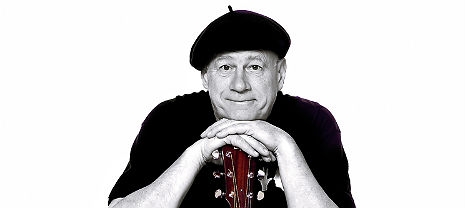
Purchase the 3 CD, 1 DVD “Le Duck’s Box Set” at Neil Innes.org. Click here for information of the upcoming Rutles tragical history tour.
